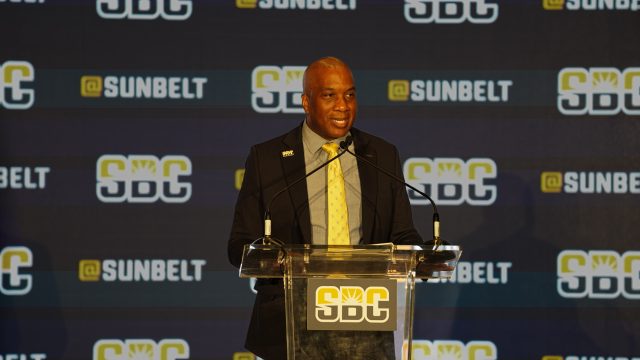Commissioner Keith Gill says league is ready to meet market challenges
By Bill Cornwell
College athletics is undergoing significant change.
Revenue sharing, roster limits, and the widening gap between well-funded Power Four conferences and Group of Six leagues are reshaping the competitive landscape. Sun Belt Conference Commissioner Keith Gill addressed those challenges in his annual “State of the Conference” speech during last week’s football media days event.
Gill spoke about the expanded 12-team College Football Playoff, a proposed NCAA governance framework aimed at preserving collaboration among Division I conferences, and the implications of the House v. NCAA settlement, which addresses student-athlete compensation.
“All Sun Belt members opted into the House Settlement and will abide by those guidelines going forward,” Gill said. “July 1 marked a new era for college sports. I’m happy that student-athletes will be permitted to earn money through their participation in college sports.
“That being said, we still need to find some consistent rules that can govern this new normal. The House Settlement is a good first step, but it does not go far enough, which is why the Sun Belt is supportive of the bipartisan SCORE Act. It is not perfect, but it will provide needed structure to Division I.”
The SCORE Act, currently under consideration in Congress, would grant antitrust protection to the NCAA, Power Four leagues, and the newly formed College Sports Commission. The bill also seeks to preempt conflicting state NIL laws, codify the House settlement, and ensure athletes are not classified as employees. Additionally, it would restore a one-time-only transfer rule, curbing the current system that allows multiple transfers.
An NCAA committee is also reviewing proposals for a revamped football calendar, including a single annual transfer window.
Gill said he’s encouraged by the Sun Belt’s growing media presence, particularly through its partnership with ESPN and its streaming platforms. He noted that Sun Belt institutions produced more than 1,500 live events for television or digital distribution last year—boosting visibility and revenue, especially for football programs.
“To get to this place, time, energy and investments were required,” Gill said. “Our members’ athletic budgets have on average tripled since the Sun Belt became a football conference. Assisting in these investments, conference revenue has grown by over 900 percent during this period and 65 percent over the last decade. And revenue from television has increased by a factor of 50 since the start of Sun Belt football.”
The Sun Belt is also expanding. Louisiana Tech has accepted an invitation to join the conference following Texas State’s announcement that it will leave for the Pac-12. A formal date for Louisiana Tech’s departure from Conference USA has not yet been announced.
Gill said Louisiana Tech fits the Sun Belt’s core identity.
“The Sun Belt Conference foundation is built on schools with passionate fanbases, great football tradition, a tradition of success in other sports and proximity that creates regional rivalries,” he said. “Louisiana Tech allows us to be better in each of those areas. We are adding a school with a long and rich tradition of FBS competition.”
In addition to leading the Sun Belt, Gill now serves as chair of the NCAA Division I Men’s Basketball Committee, which determines the annual March Madness tournament bracket—a role that brings national attention.
“I am incredibly honored and incredibly fortunate to be in this role,” Gill said. “It’s going to be a busy year and it’s going to be a challenging year, but it can do nothing but enhance the reputation of the Sun Belt across the country.”





